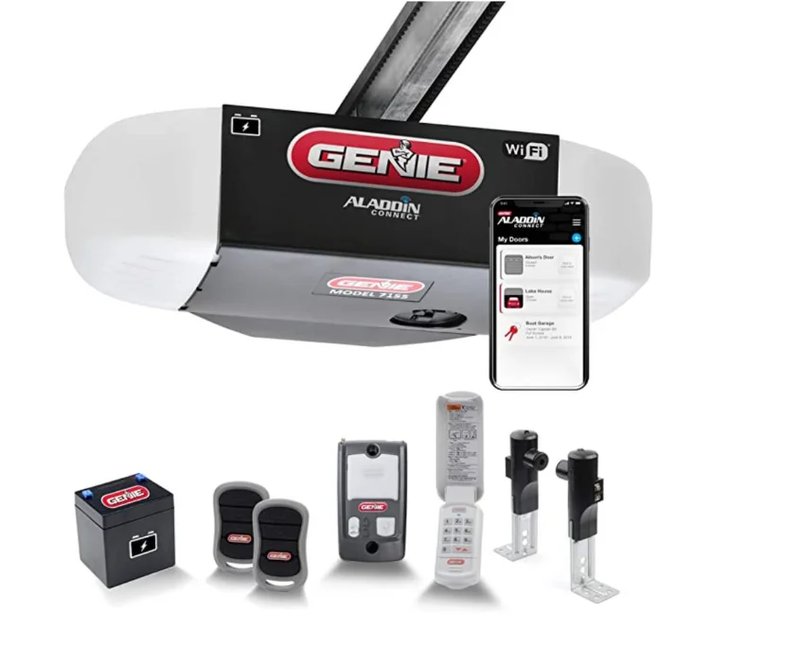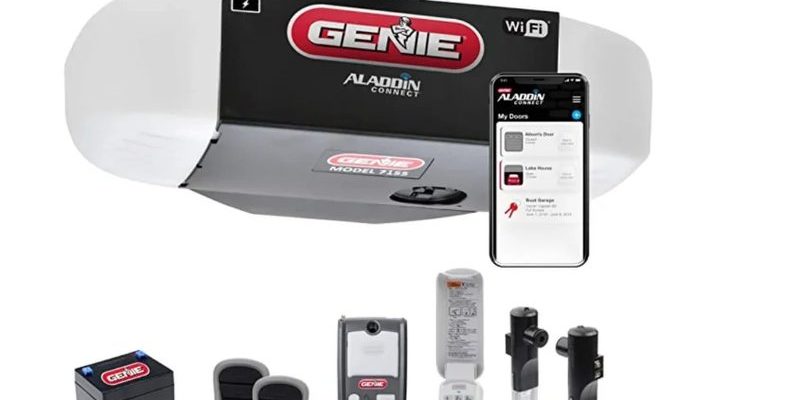
Now, you might be wondering what makes a garage door opener with diagnostic technology stand out. Well, it’s all about the features that provide real-time feedback. Many of these systems can alert you to issues like a malfunctioning motor, battery problems, or even connectivity hiccups. Brands like Chamberlain and LiftMaster, for instance, have incorporated advanced sensors and mobile app integration to give you a top-notch experience. With diagnostic technology, you’re not just opening and closing your door—you’re ensuring it runs smoothly and safely for years to come.
So, let’s dig deeper into the world of garage door openers with diagnostic technology. Whether you’re a first-time buyer or looking to upgrade your existing opener, this guide will walk you through everything you need to know.
What is Diagnostic Technology in Garage Door Openers?
Diagnostic technology in garage door openers refers to built-in systems that monitor the operation of the device. Imagine having a little computer inside your opener that tracks its performance and reports back any issues. When the opener senses a problem, it alerts you—either through a flashing light or a notification on your smartphone.
This technology can identify issues such as motor malfunction, misalignment, or battery drainage. By catching these problems early, you can avoid expensive repairs down the road. So, instead of waiting for a loud crash to announce that something’s wrong, diagnostic technology can give you a heads up.
Most modern garage door openers come with this feature as a standard. But not all options are created equal, which is why it’s essential to understand what you’re getting. When you’re shopping, look for models that provide real-time notifications and have an easy-to-use interface.
Why Choose a Garage Door Opener With Diagnostic Technology?
You might be asking yourself, “Why should I care about diagnostic technology?” Well, here are a few compelling reasons.
First, safety is paramount. Garage doors can be heavy and dangerous if they malfunction. An opener with diagnostic capabilities will alert you to potential issues before they lead to an accident. Second, savings play a significant role. Early detection of issues can save you from potentially costly repairs. Think of it as preventive maintenance—just like getting your car tuned up regularly.
Also, the convenience factor can’t be overstated. Many diagnostic openers offer mobile app connectivity, letting you check the status of your door from anywhere. Ever forget if you closed the garage door? Now, you can quickly check from your phone.
Ultimately, investing in a garage door opener with diagnostic technology brings peace of mind. You’ll be able to trust that your door is functioning correctly and be aware the minute it starts to struggle.
Features to Look For
When considering a garage door opener with diagnostic technology, you’ll want to look for several key features:
- Real-time Alerts: Openers that send notifications to your phone about operational issues are especially useful.
- Mobile App Integration: A dedicated app can make it easier to monitor your garage door’s status.
- Power Backup: In case of a power outage, a battery backup system ensures you can still operate your door.
- Smart Home Compatibility: If you already use smart home systems, an opener that can integrate with them adds convenience.
- User-friendly Interface: Choose one with a clear design for ease of use, especially when troubleshooting.
Look out for these features as they directly impact the functionality of your garage door opener. They make your life easier and safer!
Top Brands in Garage Door Openers with Diagnostic Technology
Several brands have earned a reputation for including excellent diagnostic technology in their garage door openers.
*Chamberlain* is a popular choice due to its easy app integration and real-time alerts. Their openers feature a built-in Wi-Fi system that allows you to control your door from your smartphone.
*LiftMaster* is another strong contender. They offer advanced systems with remote diagnostics, which help you troubleshoot issues remotely. Their openers also boast an impressive safety record.
*Genie* is known for providing a variety of models that fit different budgets. Their diagnostic technology isn’t as robust as some top-tier brands, but they offer solid performance and reliability.
Each brand has its strengths, so it’s essential to weigh your personal preferences when choosing.
Installation Considerations
Before you rush to buy a garage door opener with diagnostic technology, consider how it’ll be installed. Some systems can be a bit challenging for a DIYer, especially the more complex models.
If you’re comfortable with tools, you may consider installing it yourself. Most retailers provide clear instructions, and many models come with all the necessary hardware. However, if you’re unsure, hiring a professional can save you time and lead to a smoother installation.
Another key consideration is your existing garage door setup. Ensure that the opener you choose is compatible with your current door type and weight. Most openers will specify the weight and size of doors they can handle, so pay attention to that information.
Step-by-Step: Programming Your New Garage Door Opener
Once you’ve picked out a garage door opener with diagnostic technology, programming it might seem a bit daunting. But it’s actually a straightforward process! Here’s a step-by-step guide to help you out:
1. Read the Manual: Start by grabbing the user manual that came with your opener. It’ll give specific instructions you’ll need.
2. Set Up the Remote: Follow the manufacturer’s instructions to program your remote control. The process usually involves pressing a programming button on the opener, then pressing a button on the remote.
3. Connect to Wi-Fi: If your opener has mobile app capabilities, connect it to your Wi-Fi. This often involves using the app to scan for your network and entering the password.
4. Test the System: Finally, once everything is set, test your opener to ensure everything works correctly.
Indoor troubleshooting is something you can also do if any issues arise. Most modern openers with diagnostic technology will guide you along the way.
Troubleshooting Common Issues
Even with advanced technology, you might run into, shall we say, hiccups along the way. Here are some common problems and how you can troubleshoot them.
1. Door Doesn’t Respond: If your garage door isn’t responding to the remote or app, check the batteries first. Weak batteries can cause communication issues.
2. Delayed Response: Sometimes, a lag between pressing the button and the door moving can happen. This might be a Wi-Fi connectivity issue or an overload on the system. Restarting the opener and router can resolve this.
3. Frequent Alerts: If you receive constant notifications about issues, ensure the opener’s sensors are clean. Dust or dirt can interrupt their functionality.
4. Intermittent Operation: If the opener works sometimes and not others, look into potential obstructions in the tracks or alignment issues.
Remember, most issues can be resolved quickly with a little bit of troubleshooting. Familiarize yourself with the diagnostic features, as they provide alerts that help narrow down the problems.
Comparing Universal vs. Brand-Specific Remotes
It’s worth noting that while many garage door openers come with remote controls, you can also opt for universal remotes.
Brand-specific remotes are designed to work seamlessly with your specific opener, ensuring optimal communication. They often come with features tailored to your model, like the ability to check diagnostics or configure settings.
On the other hand, universal remotes can control multiple brands and models, which is great if you have different brands at home or want flexibility. However, they may not support the full functionalities, like diagnostic alerts.
When deciding, consider how often you’ll use the remote and what features you deem essential.
Choosing a garage door opener with diagnostic technology is a decision that can enhance not just your convenience, but also your safety. Understanding the features, brands, installation processes, and troubleshooting tips makes the whole experience much less daunting.
As technology continues to evolve, having a smart garage door opener will become increasingly beneficial for homeowners. It’s not just about getting in and out of your garage—it’s about peace of mind, safety, and convenience.
So, when you’re ready to make a purchase, remember this guide. Take your time, explore your options, and choose a model that fits your needs. Before you know it, you’ll have a reliable opener that keeps your garage secure and alerts you like a good friend whenever there’s an issue. Happy shopping!
